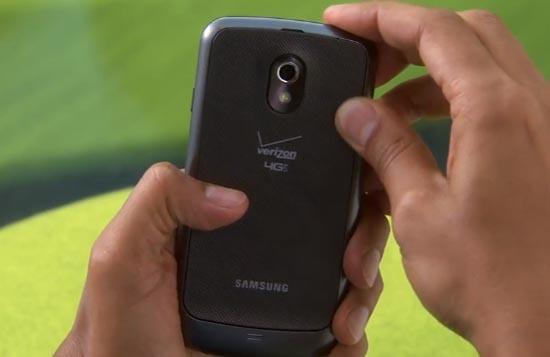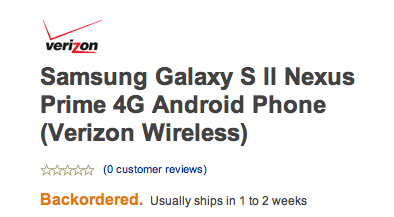
Google has had something golden. The Nexus One and Nexus S were two of the most iconic Android phones to date. As I clarified in my article about why the Galaxy Nexus is so significant, there is something truly unique about a Nexus phone from Google. It gets a software treatment above and beyond any of the other hundreds of Android phones, which in itself makes it special. But it's the vertical integration between said software and topnotch hardware that really put it on a pedestal.
Above all else, the largest advantage to the Nexus One and Nexus S was the lack of carrier intervention. These phones came with no carrier bloatware, no carrier branding and nearly no real ties to the carrier at all, beyond the radio compatibility. In fact, Google's original intent was to normalize the selling and purchasing of unsubsidized phones to the US. That was met with partial cooperation from carriers and a lot of disinterest from potential buyers. In round two, with the Nexus S, Google made sure subsidization was more openly available.
We're now entering round three, and Google is quickly losing the initiative of their Nexus line.
How so? Let's begin with the name. Galaxy Nexus. Oh, how I hate that name. The two Nexus phones (Nexi?) phones before it have followed the simple naming scheme of "Nexus [insert secondary name here]." Clean, simple and distinguishable. In this instance, the original rumored name, the Nexus Prime, would have been perfect. It's catchy, follows the pattern from before and keeps the same branding.
There are several things wrong with adding the term "Galaxy" and dropping the secondary name after Nexus. Not only does it break pattern, but it creates some gray area. To me, this tells me that Samsung is calling the shots, not Google. Of course, Google could only be trying to popularize their flagship device by association; some of the most popular phones worldwide are part of the Galaxy line by Samsung. But let's set one thing straight. A Nexus is not a Galaxy phone. Every Galaxy device to date has shipped with Samsung's custom Android interface, TouchWiz, and only a few have ever launched with current software.
I'm not trying to talk down the Galaxy line. The Galaxy S II is one phone that packs a serious punch. But in no way – other than the obvious facts that they both run Android and are made by Samsung – are the Galaxy Nexus and Galaxy S II alike. They are not from the same family – close relatives, maybe, but from different lineages.

On top of that, there is still mass confusion about the name. Third-party dealers have created a nasty mashup of all sorts of different names in their leaked (or accidental, in the case of Amazon) advertising. Above is a screen shot from AmazonWireless.com's site for the Samsung Galaxy S II Nexus Prime 4G Android Phone. That's right, soak it in. The Nexus moniker is no longer a major part of that branding. The phone is just another variant in the Galaxy S II lineup, apparently.
Of course, this could all be in error, but things like this should never happen. This name, unless corrected last minute (if it's even truly wrong), will go out in next month's Best Buy Mobile Buyer's Guide and what you see pictured above has been live on Amazon's site for at least over an hour now. Let's assume the name is correct, however. What then? That just means that Google has succumbed to the carrier's and OEM's requests and changed the name of what was supposed to be an iconic device to make Verizon's version "special."
But it doesn't end there. Take a gander at the photo at the top. This is a screen shot from an introduction video on the googlenexus YouTube channel, named, "Galaxy Nexus: Getting Started." Take note of the big, white Verizon logo and their "4G LTE" branding on the battery door.
All of these things may seem petty. But compare this to a company who knows how to build brand equity arguably better than anyone. Apple has successfully launched their ever-popular iPhone on Verizon, AT&T and Sprint without changing the name, without allowing branding of any sort on the actual hardware or physically changing anything on the device (save for the necessary radios). This, in the endgame, is what Google is trying to achieve – a phone, or line of phones, that can compete one-on-one with the iPhone. But if Google continues to let OEMs and carriers dilute their flagship each year, by the time the next two generations of Nexus phones arrive, they are going to be just another phone.
Google needs to put their foot down and take charge. (I say that a lot ...) This is their initiative and they should be in control and calling the shots. The interest for the devices are there. But each year, they change their direction to appease yet another company. I understand that Google and Apple don't operate quite on the same wavelength, and I'm grateful for that. But they could certainly take some notes and play hardball for once rather than taking the passive route.
What say you, readers? Does the name really even matter that much (keeping brand equity in mind)? Or is Google missing the mark by allowing other companies to dilute their brand? Would you buy a Nexus if it came with carrier bloatware (the Galaxy Nexus comes with a handful of carrier apps this go around), a custom skin or anything of the like?